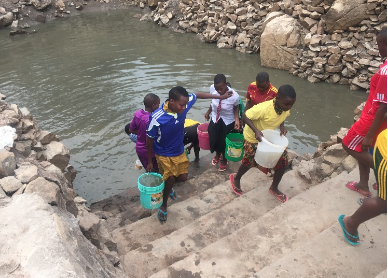TANZANIA: Don Bosco Didia Secondary School will have new sanitation facilities for 1,218 students thanks to Salesian Missions ‘Clean Water Initiative’

(MissionNewswire) Salesian missionaries with Don Bosco Didia Secondary School, located in Shinyanga in northern Tanzania, will be able to construct bathrooms, including toilets and sinks, to provide the 1,218 boys and girls attending the school with proper sanitation. The project was made possible through funding from Salesian Missions “Clean Water Initiative.”
Like many poor nations around the world, Tanzania struggles to provide clean, safe water to its citizens. Nearly one-third of the country is arid to semi-arid, and people not living near one of the three major lakes that border the country have difficulty accessing water. Groundwater is the primary water supply throughout the country, but wells are often few and far between. In many instances, wells are located near toxic drainage systems that leak into the fresh groundwater and contaminate it. According to UNICEF, as a result of a lack of access to safe, clean water for drinking, cooking and bathing, waterborne illnesses such as malaria and cholera account for close to half of the diseases affecting the population.
Shinyanga has no perennial rivers or streams. Most watercourses flow for only a few days per year. Traditionally, people use standing pools of rainwater for most human and livestock needs during the wet season and dig shallow pits in the river beds during the dry season. As a result, students attending Don Bosco Didia have faced significant challenges in their learning environment due to not having access to a safe and clean supply of water.
Further, the school lacked sanitation and hand-washing facilities. With the poor water, sanitation and hygiene conditions, and intense levels of person-to-person contact, there was a high-risk environment for the outbreak of diseases for children and staff. Children are at risk of helminth infections, long-term exposure to chemical contaminants in water like lead and arsenic, diarrheal diseases, and malaria infections, all of which may force schoolchildren to be absent from school.
The new sanitation facilities and clean water supply at Don Bosco Didia will minimize water-related risks and infections for both students and staff and bring psychological relief to all. This will enable students to focus on their studies in an environment that is safer and more conducive to education.
“From safe drinking water and healthy sanitation to agriculture, water is essential for life,” says Father Gus Baek, director of Salesian Missions, the U.S. development arm of the Salesians of Don Bosco. “This water project in Tanzania, and others around the globe, ensure Salesian centers have the water they need so staff and students can work and learn in a healthy environment.”
Almost one-third of people in Tanzania live in poverty, according to UNICEF. While the country has seen some economic growth in tourism, mining, trade and communication, the number of Tanzanians living below the poverty line has marginally increased due to rapid population growth. In some regions, up to half of the population struggles to meet the cost of essential food and shelter and other basic necessities like clothing, health care and education.
To learn more about the Salesian Missions Clean Water Initiative, go to SalesianMissions.org/water.
###
Sources:
Photos courtesy of Salesian Missions (contact for usage permissions)
Salesian Missions – Tanzania
UNICEF – Tanzania





